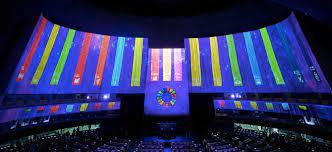
https://sdg.iisd.org/news/ministers-set-out-priorities-for-2024-summit-o...
In preparation for the 2024 Summit of the Future, UN General Assembly (UNGA) President Dennis Francis convened a ministerial meeting, which served as an opportunity for ministers to outline their vision and expectations for the Summit. Strengthened multilateral cooperation, multilateral development bank (MDB) reform, and meaningful youth engagement emerged as priorities.
The Preparatory Ministerial Meeting for the Summit of the Future took place during the UNGA High-level Week, on 21 September, following the SDG Summit from 18-19 September and the Climate Ambition Summit on 20 September.
Addressing the participants, the UNGA President said Member States’ engagement during the Ministerial Meeting demonstrates that “multilateralism is neither dead, not obsolete.” He hoped the Summit of the Future would result in agreement on “the shape and content of multilateralism for the years to come.”
Emphasizing the need for “a reformed multilateralism to reflect and address today’s political and economic realities,” UN Secretary-General António Guterres warned that without strong multilateral institutions, multipolarity “could result in even greater geostrategic tensions, chaotic competition and further fragmentation.” He welcomed Member States’ agreement that the Summit of the Future will adopt an intergovernmentally negotiated Pact for the Future and the decision for the Pact to focus on “five baskets of issues”: sustainable development and financing for development (FfD); international peace and security; science, technology and innovation, and digital cooperation; youth and future generations; and transforming global governance.
Guterres drew attention to the concrete proposals on how to further these issues, elaborated in 11 Our Common Agenda (OCA) policy briefs on: 1) the needs of future generations; 2) improving the international response to complex global shocks through an emergency platform; 3) more systematic participation by young people in decision-making processes; 4) metrics that go beyond gross domestic product (GDP); 5) global digital cooperation on maximizing and sharing the benefits of digital technology through a global digital compact; 6) reform of the global financial architecture; 7) the peaceful, secure, and sustainable use of outer space; 8) a New Agenda for Peace; 9) information integrity; 10) transforming education; and 11) UN 2.0.
Underscoring that time “is not on our side,” the Secretary-General called for “a new urgency” and “a shared sense of common purpose.” He invited Member States to “draw inspiration from recent global agreements on … biodiversity, on the high seas, on … loss and damage, and on the human right to a clean, healthy and sustainable environment.”
The EU stressed the Pact for the Future should accelerate implementation of existing agreements, including the Paris Agreement on climate change and the Kunming-Montreal Global Biodiversity Framework, and called for a multilateral approach built on transparency and accountability.
Cuba, for the G-77/China, said “the Pact of the Future should be decided through open, transparent, and inclusive intergovernmental negotiations, taking into account the views of all Member States and Groups of countries.”
India expressed confidence that the Summit of the Future will advance the concerns of the Global South, as reflected in the Group of 20 (G20) New Delhi Leaders’ Declaration. He welcomed the Summit’s aim to deliver a Global Digital Compact, to minimize the digital divide.
The US called on Member States to come together to take on conflict, hunger, gender inequality, and the climate crisis, among other issues. She emphasized the need to reform international institutions, including MDBs, reaffirm core principles of the UN Charter, and defend the fundamental human rights of all.
Among the goals of the Summit of the Future, the Russian Federation highlighted reaffirming the commitment of all UN Member States to “the principles of the UN Charter in their entirety and interdependence, giving a boost to the implementation of the 2030 Agenda, and reforming the global monetary system to reflect the actual weight and legitimate interests of the Global South.”
Japan prioritized youth and future generations, Security Council reform, and the rule of law.
Indonesia stressed the importance of reforming the current multilateral architecture and called for ensuring peace and prosperity for all.
Varaidzo Kathivu, a girls’ education activist and youth advocate from Zimbabwe, welcomed the Pact’s focus on future generations. “We want to be recognized as true and equal partners who have a stake in this just as much as you,” she said. [Preparatory Ministerial Meeting Information Note] [Summit of the Future: What Would It Deliver?]
RELATED EVENTS









